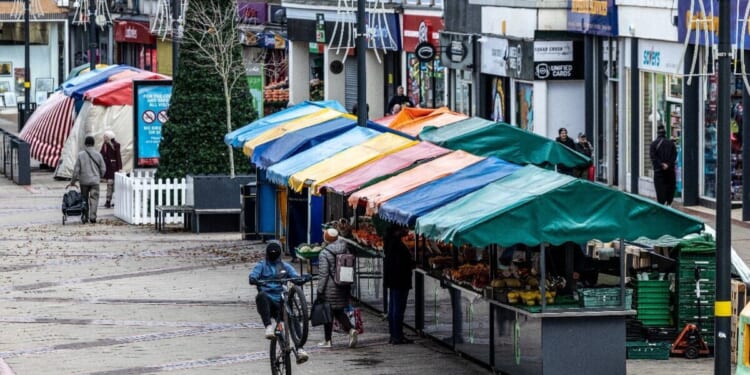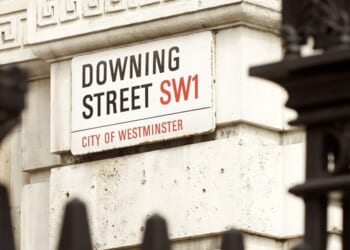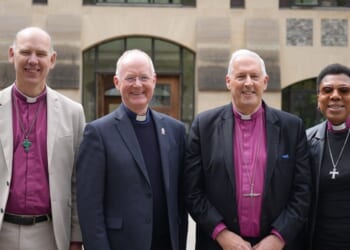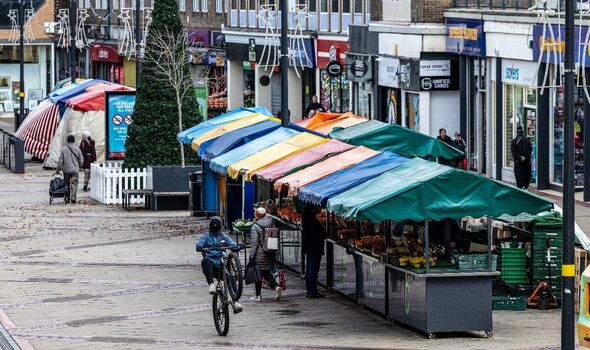
The centre of Corby is still bleak but there are signs of recovery (Image: Humphrey Nemar )
A small commuter town once voted one of the “worst” places to live in the UK is starting to become “middle class” with thousands of new homes due to be built and an 82% drop in anti-social behaviour in just eight months. Corby, in Northamptonshire, was once a tiny village until it was transformed in the early 20th century by the arrival of the Glasgow-based steel firm, Stewarts and Lloyds, in 1932, which sent the population rocketing from 1,500 to 18,000 in just two decades.
The arrival of so many Glasgow steel workers to work in the massive industrial site led to this slice of middle England being dubbed “Little Scotland”. But disaster struck in 1979 when the factory was abruptly closed leaving 10,000 people out of a job, and instantly giving the area the highest unemployment rate in Britain of 30%. The industrial legacy also brought health problems, with suspicions that toxic waste buried after it was cleared from the old factory site could have led to birth defects in children born in the 1980s.
For nearly 40 years Corby has been fighting to emerge from the shadow of industrial decline, and a combination of bleak 1960s brutalist architecture in the town centre, and lack of prospects for local residents, meant the area has regularly featured in top 10 lists of the “worst” places to live in the UK.
The most recent survey by iLiveHere survey in 2022 placed the Northampton town in seventh position nationally in a tally of the grimmest places to call home. And during our visit on a freezing Wednesday last week the grey clouds and stark new town housing estates, built for the steel workers decades earlier, did give a foreboding feel to the town.
Read more: Town in England dubbed a ‘Mini Scotland’ despite being 378 miles away
Read more: ‘Evil, ugly looking’ London commuter town voted one of the worst pl…
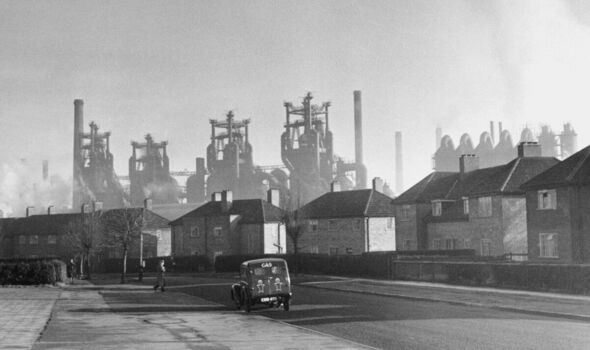
More than 10,000 people lost their jobs when the steel works closed in 1979 (Image: Getty )
But despite the very visible legacy of an industrial past ripped away, the town centre was relatively vibrant. The newly refurbished Willow Place shopping centre offered big high street names such as H&M, Primark and TK Maxx, as well as cafes and a gym. Away from the more polished areas of the refurbished parts of the town centre there were also a surprising number of high street banks, a sight which has become a rarity now even in the most well-heeled towns.
Corby is only an hour’s commute from London and several sites around the town have seen an explosion of housebuilding, with a huge 900-acre site to the east due to see more than 5,000 homes built over the next few years. The local authority also received £19.9 million through the Town Fund in June 2021 for a variety of construction projects, including a new sixth form college.
A semi-detached family home in Corby is worth around £225,000, three times cheaper than London, making the area an attractive place to live for commuter families who can’t afford property prices in the capital. But the pull of a cheaper area to find a home outside of the South East premium is also pushing up prices locally, with Corby and surrounding areas seeing a massive 33% increase in sale values since 2019.
And as we walked the streets of the town, there was definitely a sense of a past of industrial decline colliding with a more confident future.
Like many British towns today, there were small groups of people hanging around who appeared to be homeless or have possible substance addiction issues, but there were also people who seemed to be on their way to work or the gym, or carrying bags of shopping.
Ken Chapanduka, 48, who is originally from Zimbabwe, has just opened the first butchers in the town centre for years, Corby Quality Butchers.
He told the Daily Express: “I think Corby is changing, there are new estates bringing more middle-class people who are coming in, people are coming from London and now it is a mix of people who live here… I think they need to do the survey of ‘terrible towns’ again and see where we stand in it now.
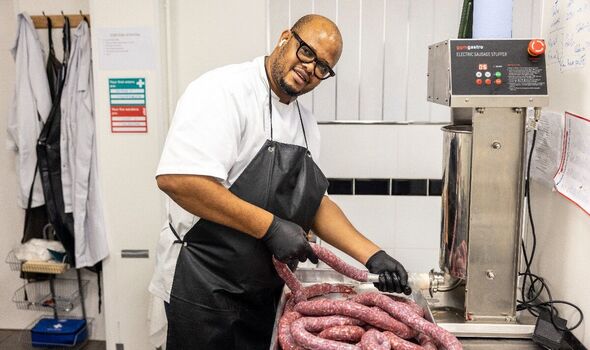
Butcher Ken Chapanduka said more ‘middle class’ people were moving to the town (Image: Humphrey Nemar)
“We are locals and we realised there was no butcher in the town centre of Corby. People were buying in the supermarket, so we decided to open a butcher for them.
“The Corby community have received us well, by next summer we will be having some queues in the shop.”
Mr Chapanduka’s shop received several customers in just the 20 minutes we were there, and he explained he was bringing a new taste sensation to the town in the shape of boerewors sausages from Zimbabwe. The traditional meat snack contains beef, pork, goat and spices. The popularity of Mr Chapanduka’s African-themed offerings could hinge on the more cosmopolitan taste buds of people moving to the area from London.
Market trader Barry Beckett runs a stall for Elliott’s Fruit and Veg, which has been operating for 35 years in Corby. He agreed the town does have an “awful” reputation, and he added: “This town is our hardest market, and we do Daventry, Bedford, Rugby as well.
“But this time of the year, there are only two pay days before Christmas and people are watching their money, say if they have three kids to pay for, as well as bills.”
Reflecting on the economic prospects for the area and Chancellor Rachel Reeves’s upcoming Budget on November 26, Mr Beckett said all politicians “say things, but then change their mind”, adding: “We need someone like Trump in charge and he would have sorted everything out by now.”
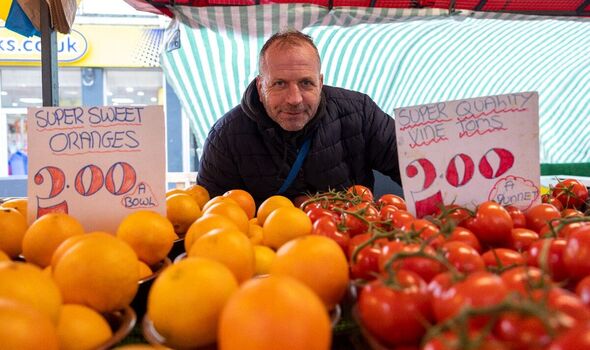
Market trader Barry Beckett admitted Corby had an ‘awful’ reputation (Image: Humphrey Nemar )
One of the key challenges for Corby has been providing decent prospects for the younger generation and to steer them away from a life of crime. According to the website CrimeRate, the rate of crime per head of population in Corby is 65% higher than Northamptonshire county as a whole.
But after a spike in 2024, Northamptonshire Police have been blitzing the causes of anti-social behaviour (ASB) and in the past eight months the force told the Daily Express youth related ASB had plummeted by 82.5% as part of Operation Alien.
Neighbourhood Policing Inspector Matt Rock said the operation was a response to reports of young people “committing anti-social behaviour, criminal damage, and escalating violence offences within the town centre”.
He added: “The whole team pulled together and conducted patrols of the town centre, arranged days of action, provided reassurance, conducted monthly meetings with town centre staff and partner agencies, applied for funding to support a local charitable company that was victim to £1,000s worth of damage.
“The work of the team has seen numerous offenders convicted and sanctioned, referrals made to the Youth Offending Service, and the most recent published figures indicate a reduction of 82.5% for youth related ASB since February 2025.”
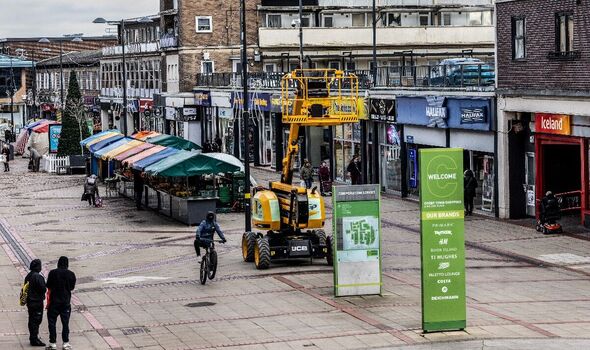
Corby has suffered from anti-social behaviour but increased police patrols have made a major difference (Image: Humphrey Nemar )
Local Reform UK councillor Elizabeth Wright, who is the Executive Member for Children’s, Education and Families, said in Corby there were “persistently high levels of deprivation linked to the decline of our steel industry, underemployment, limited mental health provision, and still too few engaging activities for teens”.
She added: “If it’s about youth buy-in, then some of these issues are rooted in the loss of the steel industry and its impact on self-identity, even 40 years later.
“They are seeking a cultural identity in an unsteady and uncertain world, and just as we were at their age, they want to be heard and recognised yet are fearful of being responsible and accountable for the very things they want.
“Ultimately, tackling antisocial behaviour in Corby means playing the long game: offering young people a real stake in their town, practical outlets for their energy, and clear consequences where those outlets are misused.”

